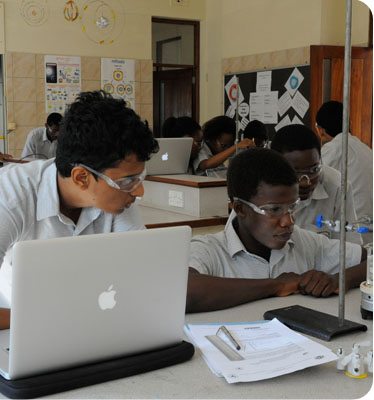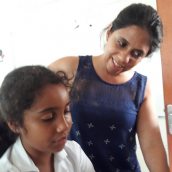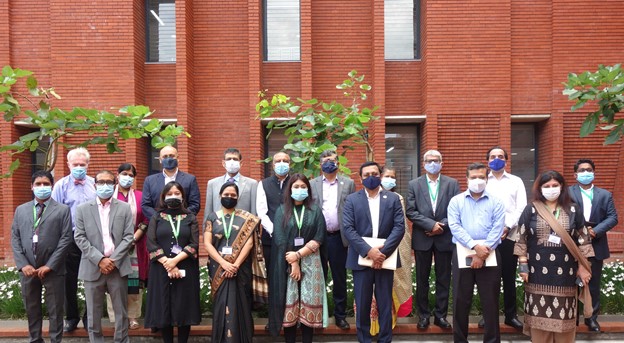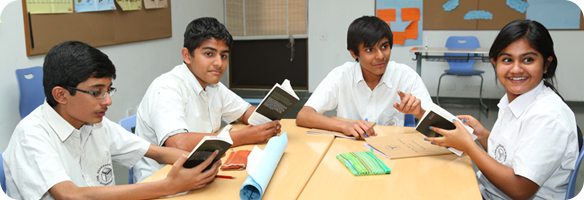
Middle Years Programme
The Senior School of the Aga Khan Academy Hyderabad is an authorised International Baccalaureate (IB) World School offering the Middle Years Programme (MYP).
We offer the IB Middle Years Programme for students in grades 6–10 as part of an integrated curriculum that includes the Primary Years Programme (grades 1–5) and the Diploma Programme (grades 11–12).
The MYP covers a study of the major disciplines, including:
- languages
- sciences
- literature
- social sciences
- mathematics
- arts
- technology
- physical education.
The five Aga Khan Curricular Strands, which are unique to the Aga Khan Academies, are integrated throughout the curriculum.
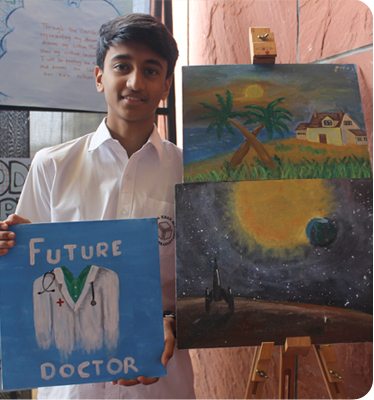 Learning through the MYP
Learning through the MYP
Our MYP students are immersed in a challenging and enriching educational environment. We ensure that they master basic skills, develop the ability to analyse and think critically, and become computer literate. We also emphasise the development of self-discipline and good work habits.
The programme encourages students to reflect on their learning and make connections with real world issues. It also helps students develop an awareness of their thought processes and learning strategies, and of how they learn best.
The MYP includes a service component that makes students aware of community and global needs. We also ensure that each student has a strong leadership experience and receives grounding in ethics, which helps prepare them for future leadership roles.
The final performance of our MYP students is assessed by teams of teachers and is validated by the IB through a monitoring process that ensures the high standards of IB schools worldwide.
MYP – grade 10 equivalence
In January 2013, the Association of Indian Universities signed an agreement with the International Baccalaureate to equate the completion of the Middle Years Programme with grade 10 of an Indian board assessment. This agreement now allows students who complete the MYP to apply for admission for higher studies to any school in India.
For further information about applying to the MYP at the Academy, please see the admission requirements or contact us.
Nuala Alibhai: Enriching educational and social programmes at the Academy
“The Academy through the International Baccalaureate curriculum has earned a positive reputation for its pluralistic approach, providing a holistic learning environment, developing leaders and achieving educational excellence.”
Nuala Alibhai is the Learning Student Support Coordinator for junior and senior schools at the Aga Khan Academy Mombasa. In this role, she works in collaboration with the Academy’s Principals to develop on-going systems of support for the student community. This includes providing leadership, management and advice on inclusion within the school to develop a differentiated programme that both challenges and meets the needs of students. She also ensures that the Student Support Unit effectively identifies students with any needs for additional support need, including gifted and talented, as well as vulnerable students.
She was born in Kenya where she acquired her basic education. She obtained her undergraduate degree from University College London as Speech and Language Therapist. Later she pursued her Masters in Inclusive Education, at the University of the West of Scotland where she completed her research in inclusive education at the early years level.
At the Aga Khan Academy Mombasa, Nuala works on a Value-based Education Programme, as a Curriculum Designer, through the Professional Development Centre at the Academy. She came to the Academy with a diverse background in inclusive education at a school, community and public policy level. “I was keen to apply this knowledge and skills within a mainstream school setting, to enable every student to achieve and succeed in school, career and life,” she remarks.
It has been Nuala’s endeavour to improve social outcomes through strategic planning and capacity building at the local government and community level. She is also passionate about designing and developing alternative educational programmes for vulnerable children, in order to ensure that they realise their full potential, so they can succeed in life as dignified equals. She has achieved both of these objectives by working for the past 15 years as a speech and language therapist and as an educational consultant in both the private and public sectors in Kenya and the UK.
Since September of 2016, Nuala has been with the Academy and appreciates how the Academy has provided her with opportunities to develop her teacher training skills and curriculum development skills. Nuala says, “I enjoy working with teachers who bring their hands on experience in the classroom and subject relevant knowledge to the table so we can enrich the educational and social programmes at the Academy.”
When asked what led her to choose a career in teaching, Nuala replies, “Karma! I started my career as a health professional but on my return to Kenya, I was sought after to do training, policy work and change management in the education sector. As my experience and confidence in the area grew, I began specialising in education. I have always seen myself working with children, so education was also an attractive choice.”
According to Nuala, the International Baccalaureate (IB) curriculum and the Aga Khan Academy strands set the Academy apart from other educational institutions. “It is one of the few schools in Kenya that offers the IB curriculum, which I consider to be the gold standard in education because of its holistic approach, academic rigor and emphasis on community service. The strands are added dimensions that help students make better sense of themselves, others, the world around them and the interconnectedness of all these elements.”
In terms of ensuring a climate of pluralism on campus where students from different racial, ethnic and faith backgrounds work together, Nuala feels the pluralism strand is already integrated into the lessons in the classroom, extracurricular activities after school and during out of school activities. “Collaboration skills are one of the approaches to teaching and learning, so students are exposed to activities that encourage and enable them to work with others who are different from them and have different opinions than them. They are encouraged to listen to others respectfully and consider their perspectives. This builds communication skills and empathy in students. These skills are then transferred to the student’s day-to-day interactions and not only in the classroom,” she reiterates.
When asked about the most rewarding aspect of teaching at Aga Khan Academy Mombasa, she replied, “The collaborative spirit and practice amongst the staff.” She further adds that there is appreciation and inclusion of every individual’s knowledge, skill and experience in decision-making. According to Nuala, strategies and unit plans are collectively produced not only to enhance the quality of the teaching and learning experience for the student, but also to allow the adult to grow, as a professional, in the process. “The teachers on the whole are approachable, warm and a joy to work with,” she comments. Parents are also involved as much as possible in their children’s education, she mentions. Parents get regular updates from the school on their child’s progress and well-being and are given recommendations of how to extend the learning and support beyond the walls of the school, she adds.
Nuala strongly feels that her position at Aga Khan Academy Mombasa has given her the opportunity to individualise the learning for every student. “My prayer is that this opportunity helps them become more self aware, reveal their talents and inspire them to make bigger strides forward with direction and confidence.”
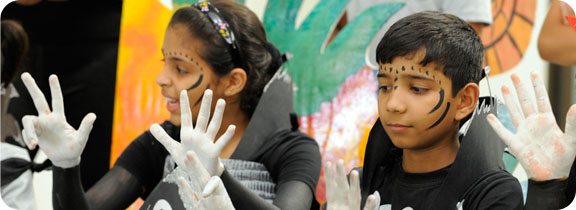
What Makes Us Unique
The Aga Khan Academies are an integrated network of about 18 residential schools in 14 countries in Africa, South and Central Asia, and the Middle East. They are dedicated to expanding access to the highest standard of education for exceptional young men and women, regardless of their ability to pay.
The Academies are more than just residential schools that strive to give their students a sound academic foundation. Each school emphasises the importance of academic excellence while instilling in students a sense of civic responsibility, leadership skills, and the desire, ability, and commitment to give back to their communities locally and globally.
The Academies are grounded in an educational approach that measures success not just by academic achievement, but by how students apply what they know to make the world a better place.
Students receive a grounding in ethics and also develop openness towards difference and acceptance of pluralism by living in diverse communities. As the network of Academies develops, both students and teachers will participate in visits and exchanges to Academies in other countries and regions.
Aims of the Academies programme
Our programme aims to:
- build inquiring, tolerant and creative minds
- empower gifted individuals, including girls, to innovate and lead
- over time, educate a cohort of well-trained local leaders with a sound ethical outlook and great intellectual capacity
- establish a global learning community across diverse geographic, social, economic, religious and tribal boundaries by providing needs-blind and merit-based admissions
- develop highly trained and effective educators
- positively influence education broadly across the targeted regions of the world, with measurable impact.
“The Aga Khan Academies aim to create ethical leaders with a strong sense of civic responsibility who will go on to the best universities in the world, pursue careers of their choice and…become leaders in the governments and the institutions of civil society in their own countries, in international organisations and in all those institutions, academic, economic and artistic that create positive change in our world.”
Embedded in our programme, the Aga Khan Curricular Strands (AK Strands) aim to strengthen understandings and outlooks needed by leaders of the future.
They encompass five critical areas of study:
- Ethics
- Pluralism
- Cultures (with an emphasis on Muslim civilisations)
- Governance and Civil Society
- Economics for Development.
The AK Strands examine issues of global importance and are also tailored to the cultural context of each Academy. This allows students to engage with international issues and challenges while remaining strongly grounded in their local context.
Videos
The videos below provide more information about the Aga Khan Academy Maputo and the Aga Khan Academies programme.
Pages
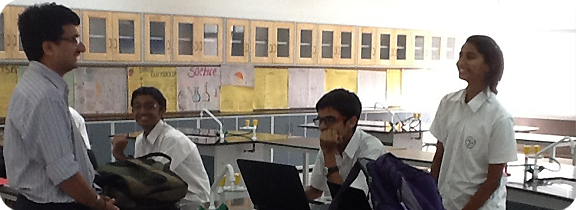
Faculty Development
Promoting excellence in teaching, both on campus and more broadly, is a fundamental goal of the Aga Khan Academies.
The effort to establish a Professional Development Centre (PDC) at each Academy is one of the outstanding features of the network. The PDC aims to strengthen the profession of teaching in the region by providing substantial professional learning opportunities and modelling highly effective educational practice.
Developing strength in teaching
The Academies aim to identify and develop teachers of the highest quality who are committed to both the all-round development of young people and to their own professional excellence. The Academy PDCs support excellence by striving to model best practices in teaching and learning within all of its classes and by providing high quality development opportunities for all Academy teachers.
Faculty members are also enriched by opportunities to work collaboratively with more experienced colleagues from around the globe and to teach abroad within the Aga Khan Academies network.
Investing in teachers
In addition to a broad programme of professional development for faculty and staff, the Academy PDCs offer substantial programmes under their Professional Learning for Educators Series (PLES) for teachers in local government, independent and not-for profit schools.
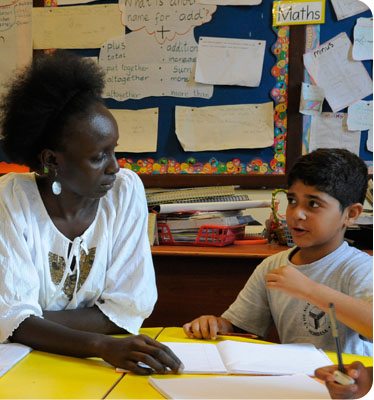
The PLES programmes are specifically designed by the Aga Khan Academies to respond to the needs of teachers, as identified through extensive market research and dialogue with government officials and education departments.
The series includes programmes for teachers in various subject areas as well as specialised programmes focussing on the skills and capabilities required for effective teaching.
Each programme builds professional competence by focussing equally on enhancing teachers’ subject knowledge and on how best to teach that subject. Each provides participants with a balance of intensive facilitated learning activities followed by an extended period of assisted application and observation within the context of their own classrooms.
To read about participants' experience of these programmes, click here.
"In this ambition, we are heartened by an important new World Bank study which indicates that it is not the quantity of time or money that leads to educational success, but rather the quality of specific educational experiences. The stimulus provided by extraordinary teachers and exceptional companions is most important."
Videos
The videos below provide more information about the Academies and glimpses into student endeavours at the Aga Khan Academy Mombasa.
Pages
Videos
The videos below provide more information about the Academies and glimpses into student life at the Aga Khan Academy Hyderabad.
Pages
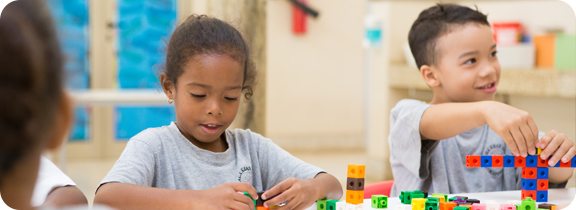
About the Academy
The Aga Khan Academy Maputo is the third in a network of Aga Khan Academies established by His Highness the Aga Khan. It follows the highly successful model established by the first two Academies, which opened in Mombasa, Kenya in 2003 and Hyderabad, India in 2011.
The Aga Khan Academy Maputo has been accredited as an International Baccalaureate (IB) World School for the Primary Years Programme, Middle Years Programme and Diploma Programme.
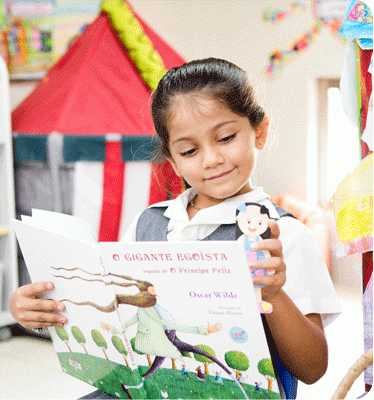 The Academy features state-of-the-art facilities, a multicultural student body, and an experienced team of educators and staff. We provide students with education of the highest standard in order to prepare them for lives characterised by leadership and service.
The Academy features state-of-the-art facilities, a multicultural student body, and an experienced team of educators and staff. We provide students with education of the highest standard in order to prepare them for lives characterised by leadership and service.
Admission to the Academy is means-blind and is based on merit. We consider all eligible students regardless of socio-economic status.
A culture of excellence
As with all the Aga Khan Academies, we are committed to excellence in all aspects of education. This commitment includes the academic curriculum as well as the campus where students live and learn.
Our campus is architect designed and is being purpose built. With state-of-the-art classrooms and resource areas, and extensive sports facilities, our campus will provide an inspiring environment for both students and staff.
At the Academy, we strive to create a balance between academic demands, sports, cultural activities and community life. We challenge our students to be intellectually inquisitive and socially conscious. We also encourage them to respect and appreciate other people’s cultures, social structures, values and beliefs.
A rigorous academic programme
The Aga Khan Academies' academic programme has been developed through the implementation of the widely-recognised International Baccalaureate. The programme is designed to challenge students of all backgrounds.
Our aims for our students include:
- promoting academic excellence
- enhancing analytical and study skills
- building leadership skills
- fostering an ethical outlook and sense of civic responsibility
- developing an understanding of global issues
- encouraging creativity.
Experienced local and international teachers lead our programmes. Faculty members are up-to-date with the best educational practices. They are committed both to their students’ learning and to their own continuing professional development.
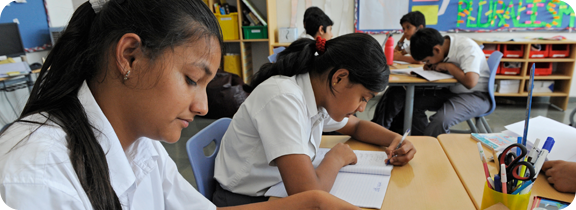
Academic Programme
The academic programme of the Aga Khan Academies is both comprehensive and rigorous. It encompasses formal academics as well as global themes (curriculum strands) that are designed to give students the skills to lead in their fields globally and locally.
The Academies' academic programme is organised according to the framework and principles of the globally renowned International Baccalaureate.
The academic curriculum is designed to ensure that students' theoretical learning is linked to relevant local and international issues through the focus on the Aga Khan Curricular Strands. Through this process, students are able to develop their understanding of the world alongside analytical skills, an ability to learn independently and the desire to make a difference.
The Academies are in the process of putting in place their dual language programme where English and a national language will both be languages of instruction in the Junior School. The aim is for students throughout the school to be at least bilingual.
Additionally, the programme is designed to equip students with the appropriate technical skills, so they have the opportunity to explore how technology is shaping communities.
Through an active, student-centred approach focused on mastery, the academic programme – along with co-curricular programmes – gives students the skills and ability to pursue a competitive, high-quality, post-secondary education. They are able to become thoughtful, curious, ethical and community-oriented leaders who are prepared to take on the challenges of a complex and interdependent world.
